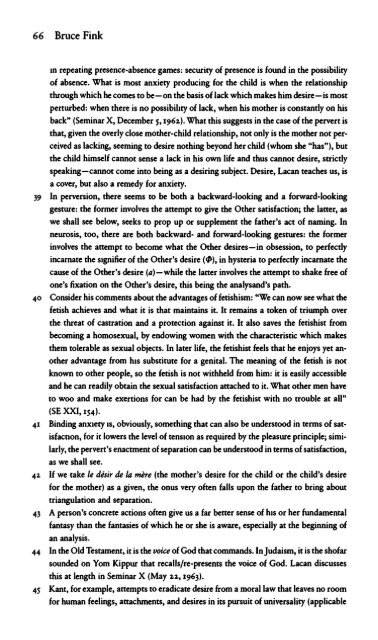Perversion the Social Relation
Perversion the Social Relation
Perversion the Social Relation
- No tags were found...
Create successful ePaper yourself
Turn your PDF publications into a flip-book with our unique Google optimized e-Paper software.
66 Bruce Finkin repeating presence-absence games: security of presence is found in <strong>the</strong> possibilityof absence. What is most anxiety producing for <strong>the</strong> child is when <strong>the</strong> relationshipthrough which he comes to be—on <strong>the</strong> basis of lack which makes him desire—is mostperturbed: when <strong>the</strong>re is no possibility of lack, when his mo<strong>the</strong>r is constantly on hisback" (Seminar X, December 5,1961). What this suggests in <strong>the</strong> case of <strong>the</strong> pervert isthat, given <strong>the</strong> overly close mo<strong>the</strong>r-child relationship, not only is <strong>the</strong> mo<strong>the</strong>r not perceivedas lacking, seeming to desire nothing beyond her child (whom she "has"), but<strong>the</strong> child himself cannot sense a lack in his own life and thus cannot desire, strictlyspeaking—cannot come into being as a desiring subject. Desire, Lacan teaches us, isa cover, but also a remedy for anxiety.39 In perversion, <strong>the</strong>re seems to be both a backward-looking and a forward-lookinggesture: <strong>the</strong> former involves <strong>the</strong> attempt to give <strong>the</strong> O<strong>the</strong>r satisfaction; <strong>the</strong> latter, aswe shall see below, seeks to prop up or supplement <strong>the</strong> fa<strong>the</strong>r's act of naming. Inneurosis, too, <strong>the</strong>re are both backward- and forward-looking gestures: <strong>the</strong> formerinvolves <strong>the</strong> attempt to become what <strong>the</strong> O<strong>the</strong>r desires—in obsession, to perfectlyincarnate <strong>the</strong> signifier of <strong>the</strong> O<strong>the</strong>r's desire (0), in hysteria to perfectly incarnate <strong>the</strong>cause of <strong>the</strong> O<strong>the</strong>r's desire (a)—while <strong>the</strong> latter involves <strong>the</strong> attempt to shake free ofone's fixation on <strong>the</strong> O<strong>the</strong>r's desire, this being <strong>the</strong> analysand's path.40 Consider his comments about <strong>the</strong> advantages of fetishism: "We can now see what <strong>the</strong>fetish achieves and what it is that maintains it. It remains a token of triumph over<strong>the</strong> threat of castration and a protection against it. It also saves <strong>the</strong> fetishist frombecoming a homosexual, by endowing women with <strong>the</strong> characteristic which makes<strong>the</strong>m tolerable as sexual objects. In later life, <strong>the</strong> fetishist feels that he enjoys yet ano<strong>the</strong>radvantage from his substitute for a genital. The meaning of <strong>the</strong> fetish is notknown to o<strong>the</strong>r people, so <strong>the</strong> fetish is not withheld from him: it is easily accessibleand he can readily obtain <strong>the</strong> sexual satisfaction attached to it. What o<strong>the</strong>r men haveto woo and make exertions for can be had by <strong>the</strong> fetishist with no trouble at all"(SE XXI, 154).41 Binding anxiety is, obviously, something that can also be understood in terms of satisfaction,for it lowers <strong>the</strong> level of tension as required by <strong>the</strong> pleasure principle; similarly,<strong>the</strong> pervert's enactment of separation can be understood in terms of satisfaction,as we shall see.42 If we take le désir de la mère (<strong>the</strong> mo<strong>the</strong>r's desire for <strong>the</strong> child or <strong>the</strong> child's desirefor <strong>the</strong> mo<strong>the</strong>r) as a given, <strong>the</strong> onus very often falls upon <strong>the</strong> fa<strong>the</strong>r to bring abouttriangulation and separation.43 A person's concrete actions often give us a far better sense of his or her fundamentalfantasy than <strong>the</strong> fantasies of which he or she is aware, especially at <strong>the</strong> beginning ofan analysis.44 In <strong>the</strong> Old Testament, it is <strong>the</strong> voice of God that commands. In Judaism, it is <strong>the</strong> shofarsounded on Yom Kippur that recalls/re-presents <strong>the</strong> voice of God. Lacan discussesthis at length in Seminar X (May 22,1963).45 Kant, for example, attempts to eradicate desire from a moral law that leaves no roomfor human feelings, attachments, and desires in its pursuit of universality (applicable








